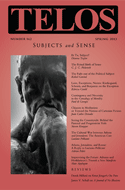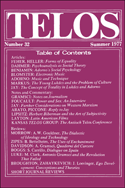By Adrian Pabst · Wednesday, May 29, 2013 Adrian Pabst’s “Athens, Jerusalem, and Rome: A Reply to Luciano Pellicani” appears in Telos 162 (Spring 2013). Read the full version online at the Telos Online website, or purchase a print copy of the issue in our store.
 According to Luciano Pellicani, the U.S. culture wars are grounded in a perpetual struggle between the enlightening forces of reason and democracy, on the one hand, and the dark forces of faith and theocracy, on the other hand. Accordingly, he claims that the Puritans sought to establish a medieval collectivist theocracy, not a modern market democracy, and that the U.S. “culture war” between enlightened secular liberalism and reactionary religious conservatism ultimately rests on the perpetual battle between Athenian reason and the faith of Jerusalem. According to Luciano Pellicani, the U.S. culture wars are grounded in a perpetual struggle between the enlightening forces of reason and democracy, on the one hand, and the dark forces of faith and theocracy, on the other hand. Accordingly, he claims that the Puritans sought to establish a medieval collectivist theocracy, not a modern market democracy, and that the U.S. “culture war” between enlightened secular liberalism and reactionary religious conservatism ultimately rests on the perpetual battle between Athenian reason and the faith of Jerusalem.
Continue reading →
By J. F. Dorahy · Tuesday, March 5, 2013 As an occasional feature on TELOSscope, we highlight a past Telos article whose critical insights continue to illuminate our thinking and challenge our assumptions. Today, J.F. Dorahy looks at György Márkus’s “The Soul and Life: The Young Lukács and the Problem of Culture,” from Telos 32 (Summer 1977).
 György Márkus’s essay on Lukács, “The Soul and Life,” is a seminal insight into one of the most influential philosophical oeuvres of the twentieth century. This piece, published at a time when only a handful of Márkus’s papers were available to English-language readers, reflects an intimacy with Lukács’s aesthetics that is unsurpassed in Lukács scholarship. (Márkus jointly edited, along with Frank Benesler, Lukács’s posthumously published Heidelberger Philosophie der Kunst 1916–18 and the Heidelberger Ästhetik 1916–1918, works that figure prominently in the essay under consideration.) The discussion in “The Soul and Life” centers on the problem of the possibility of culture as treated by Lukács in his pre-1918, or pre-Marxist, writings. György Márkus’s essay on Lukács, “The Soul and Life,” is a seminal insight into one of the most influential philosophical oeuvres of the twentieth century. This piece, published at a time when only a handful of Márkus’s papers were available to English-language readers, reflects an intimacy with Lukács’s aesthetics that is unsurpassed in Lukács scholarship. (Márkus jointly edited, along with Frank Benesler, Lukács’s posthumously published Heidelberger Philosophie der Kunst 1916–18 and the Heidelberger Ästhetik 1916–1918, works that figure prominently in the essay under consideration.) The discussion in “The Soul and Life” centers on the problem of the possibility of culture as treated by Lukács in his pre-1918, or pre-Marxist, writings.
Continue reading →
|
|
 According to Luciano Pellicani, the U.S. culture wars are grounded in a perpetual struggle between the enlightening forces of reason and democracy, on the one hand, and the dark forces of faith and theocracy, on the other hand. Accordingly, he claims that the Puritans sought to establish a medieval collectivist theocracy, not a modern market democracy, and that the U.S. “culture war” between enlightened secular liberalism and reactionary religious conservatism ultimately rests on the perpetual battle between Athenian reason and the faith of Jerusalem.
According to Luciano Pellicani, the U.S. culture wars are grounded in a perpetual struggle between the enlightening forces of reason and democracy, on the one hand, and the dark forces of faith and theocracy, on the other hand. Accordingly, he claims that the Puritans sought to establish a medieval collectivist theocracy, not a modern market democracy, and that the U.S. “culture war” between enlightened secular liberalism and reactionary religious conservatism ultimately rests on the perpetual battle between Athenian reason and the faith of Jerusalem.  György Márkus’s essay on Lukács, “The Soul and Life,” is a seminal insight into one of the most influential philosophical oeuvres of the twentieth century. This piece, published at a time when only a handful of Márkus’s papers were available to English-language readers, reflects an intimacy with Lukács’s aesthetics that is unsurpassed in Lukács scholarship. (Márkus jointly edited, along with Frank Benesler, Lukács’s posthumously published Heidelberger Philosophie der Kunst 1916–18 and the Heidelberger Ästhetik 1916–1918, works that figure prominently in the essay under consideration.) The discussion in “The Soul and Life” centers on the problem of the possibility of culture as treated by Lukács in his pre-1918, or pre-Marxist, writings.
György Márkus’s essay on Lukács, “The Soul and Life,” is a seminal insight into one of the most influential philosophical oeuvres of the twentieth century. This piece, published at a time when only a handful of Márkus’s papers were available to English-language readers, reflects an intimacy with Lukács’s aesthetics that is unsurpassed in Lukács scholarship. (Márkus jointly edited, along with Frank Benesler, Lukács’s posthumously published Heidelberger Philosophie der Kunst 1916–18 and the Heidelberger Ästhetik 1916–1918, works that figure prominently in the essay under consideration.) The discussion in “The Soul and Life” centers on the problem of the possibility of culture as treated by Lukács in his pre-1918, or pre-Marxist, writings. 

